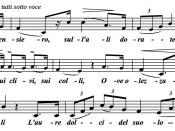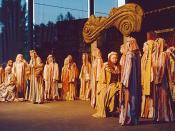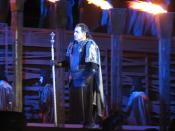The Italian opera and the German opera are two different fields that both share characteristics, some of which are paralleled, and some of which contrast. Specifically, Giuseppe Verdi and Richard Wagner use motifs such as: redemption through love, patriotism, and sacrifice which run throughout both of their operas. The theme of betrayal also seems to be echoed throughout both operas; yet they are each used to project a different response. The significance of this comparison demonstrates that Verdi and Wagner may allude to the same references, such as Victor Hugo, Shakespeare, and Byron, but the operas The Flying Dutchman (German opera) and that of Nabucco (Italian opera) are completely different in context, and musical style; perhaps even The Flying Dutchman is a musical imitation of Italian opera while still trying to originate his own musical ideas as well.
The Italian opera has three main genres: the Baroque, the Romantic, and the Modern.
Italian opera first started to materialize in the seventeenth century, and approximately two hundred years later, the Romantic genre was introduced. Throughout the seventeenth century there were many developments in Italian opera due to Claudio Monteverdi (1567-1643), who wrote his first opera in 1607 (La Favola d'Orfeo) which to this day, is still performed. He introduced ideas such as the bel canto and buffa styles. Having a strong connection between the instrumental music and words was of major importance to Monteverdi, and this became a major theme for other opera composers to follow.
The Romantic operas started to appear in the early 19th century. Romantic operas stress the world of imagination and emotions and through its music and aria's was this theme magnified. Giuseppe Verdi (1813-1901) was one the composers of this era who changed the way composers would forever more look at operatic writing. His first successful...


